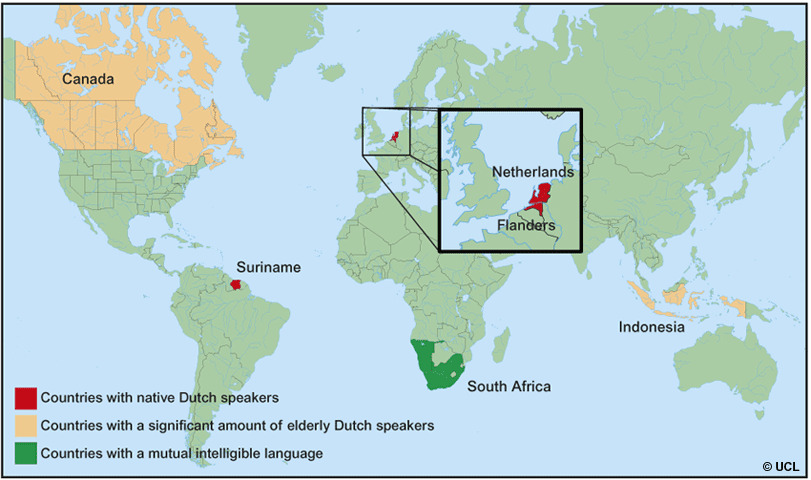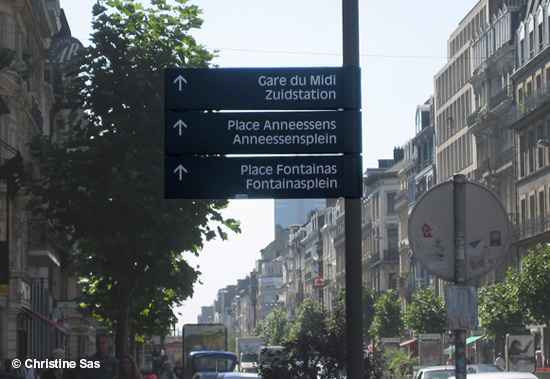Who speaks it?
Dutch is spoken not only in the Netherlands, but it is also the official language of Flanders, the neighbouring northern provinces of Belgium.
Worldwide, Dutch is a national language in Suriname (South America), Aruba and the Dutch Antilles (Caribbean). In total Dutch has 23 million mother tongue speakers. On top of that, there are also 4 million people worldwide who speak Dutch as a second or foreign language. So not so small after all!
Scroll over the name of the country to find out how many speakers of Dutch are there.

|
Read more about the different countries and regions where Dutch is spoken below:
The Netherlands
The Netherlands has 16 million inhabitants and Dutch is the only official language of the country. Frisian, spoken in the Northern province of Fryslân, has been granted local offical language status too. Frisian is very close to English.
Flanders
Dutch (sometimes called Flemish) has always been the mother tongue of the majority of people in Flanders, but it was not always recognised as such because Flanders was governed by many foreign rulers in the past. When the French took over in the 18 th century, Dutch was deliberately pushed aside. French was the language of the upper and middle classes and the ruling elite. In 1898 Dutch was finally granted official status, but as change was slow, it was decided in 1963 to make it the only language allowed in Flemish education and public life. Nowadays, there are 6 million speakers of Dutch in Flanders The southern part of Belgium, Wallonia, remained entirely French-speaking and the capital, Brussels, is bilingual.

Suriname
Suriname has many local languages but Dutch is used as a language for different groups to communicate. It is the language of government and education, even though it may only be the mother tongue of about 60% of the population (475, 000). Most speak Sranan, an English based creole.
South Africa
Afrikaans, one of 11 official languages used in South Africa, has its roots in Dutch, as the Dutch set up trading posts there in the 17 th Century, when they were sailing to the East (i.e. Indonesia). Settlers moved inland and so the language spread and was influenced and altered by other settlers and local languages. It is also used in Namibia, where it is the largest language, even though English is the official language. The result is a language which still resembles Dutch but has developed into its own, as you can see below:
| Afrikaans | Dutch | English |
| vir | voor | for |
| my | mijn | mine |
| skool | school | school |
| vry | vrij | free |
| aksie | actie | action |
Afrikaans has influenced South African English as well, so you could hear a sentence like: H e's gonna gooi (throw) a geelbek (white seabass) on the braai (barbecue) which may be hard for other English speakers to understand, but fairly easy for a Dutch or Afrikaans speaker with some knowledge of English. There are 7 million mother tongue speakers of Afrikaans and about 10 million who speak it as a second language.
Listen to Afrikaans on the radio on www.rsg.co.za/luister.asp.
Canada
As the legend on the map indicates, Canada has mainly older Dutch speakers (140, 000). Many Dutch and Flemish people moved there in the early 19th century, as settlers, and another wave arrived in the 1950’s, in order to set up a new life after the second World War, which had hit the Netherlands hard. These people took their language with them and passed it on to their children, even though they were very keen to assimilate. There are about 900, 000 people of Dutch descent in Canada, making it the largest minority.
Indonesia
Dutch ceased to be an official language of Indonesia after its independence from the Netherlands in 1949. It had been a language of importance ever since the Dutch East Indies Company arrived on the islands in the 17 th Century. That is also why there are still people who learn and speak the language, in order to study older documents. Older people may still speak it as they had to learn it at school and it carries a certain prestige.